Energy
What's New
4th GMS Energy Transition Task Force Meeting
The 4th GMS Energy Transition Task Force Meeting (ETTF-4) was held on 11 December 2024 in Jakarta, Indonesia. Held on the sidelines of back-to-back events on the ASEAN Power Grid (APG), the 4th ETTF Meeting discussed GMS country and regional updates related to energy transition, plans on regional power trade and demand side management, ETTF work streams, and development partner support for the GMS energy program.
Greater Mekong Subregion countries are in varying stages of economic development but share common goals concerning energy security and environmental protection. Progress have been made in promoting renewable energy, clean fuels, and energy efficiency, but new energy solutions remain crucial to the subregion’s advancement.
The GMS Economic Cooperation Program Strategic Framework 2030 (GMS-2030) emphasizes cross-border power trade, establishment of regional grid codes, development of regional markets, and expanding clean energy investments with a greater role for the private sector.
The Regional Power Trade Coordination Committee (RPTCC) managed regional power trade in the subregion from 2004–2022. In July 2022, at the 29th RPTCC meeting, the committee formally transitioned to the GMS Energy Transition Taskforce (ETTF). Among other things, the transition to ETTF ushers in closer energy cooperation with the Association of Southeast Asian Nations (ASEAN) and its initiatives, such as the ASEAN Power Grid.
New Energy Solutions Needed for the GMS
Energy consumption in the GMS countries has grown intensively as their economies develop, driven mostly by residential and industrial sectors. Demand is forecasted to increase materially over the medium term.
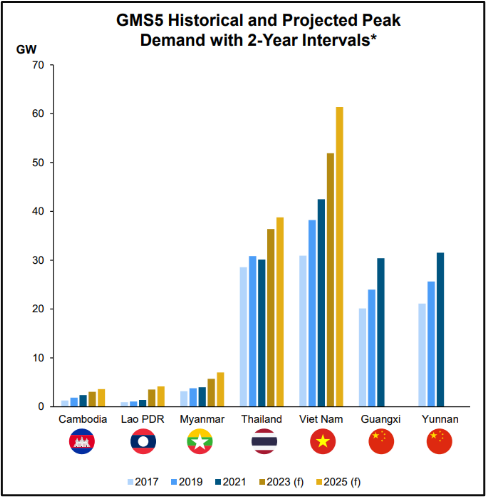
GMS countries have used different approaches to increase access to reliable, affordable, and low-carbon energy.
- Power generation. Coal and gas remain prominent in installed capacity, but there is a diverse, complementary, and growing mix of renewables across GMS countries. Focus on specific types of renewables varies based on each country’s natural resource endowment but hydropower is fundamental to the subregion. In July 2021, ADB approved a technical assistance to support countries in Southeast Asia to accelerate transition to clean energy.
- Power sector planning. Key themes that have emerged in the recent power development plans of GMS countries include the following: (i) development of grid infrastructure, battery energy storage system (BESS) and pumped storage hydropower; (ii) resource-oriented supply build-out; (iii) renewable-enabling policies and (iv) electric vehicle targets and planning.
- Regional cooperation.Through the GMS platform, cooperation with ASEAN and other avenues for energy cooperation, GMS countries are working together to meet the subregion’s demand for new energy solutions. They share knowledge, experiences and lessons learned, and pursue initiatives that enhance and overcome challenges to cross-border electricity trade.
See initiatives of the GMS Energy Transition Task Force to promote energy security in the subregion in a sustainable manner.
Related
Key Energy Resources
- Agreements and MOUs
- Facilitating Power Trade in the Greater Mekong Subregion
- GMS Road Map for Expanded Energy Cooperation
- Update of the GMS Regional Master Plan
- Study: Building a Sustainable Energy Future - The Greater Mekong Subregion
Contact Persons
Focal Persons at the Asian Development Bank
-
Hyunjung Lee
Energy Sector Office
Sectors Group -
Atsumasa Sakai
Energy Sector Office
Sectors Group
Other Concerned Staff & Consultants
-
Joao Aleluia
Energy Sector Office
Sectors Group -
Architrandi Priambodo
Energy Sector Office
Sectors Group -
Jeffrey Almera
Energy Sector Office
Sectors Group -
Amelia Esteban
Energy Sector Office
Sectors Group -
Antonio Ressano
Regional Cooperation and Integration Unit
Southeast Asia Department -
Rafaelita Jamon
Regional Cooperation and Integration Unit
Southeast Asia Department/GMS Secretariat
Send inquiries to GMS Secretariat.
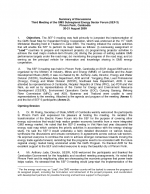
Third Meeting of the GMS Subregional Energy Sector Forum (SEF-3): Summary of Discussions
The SEF-3 meeting was held primarily to jumpstart the implementation of the GMS Road Map for Expanded Energy Cooperation, which was endorsed at the 15th GMS Ministerial Meeting held in Thailand in June 2009.

Special Meeting of the GMS Subregional Energy Sector Forum (Special SEF): Summary of Discussions
The Special SEF meeting was held to refine and finalize the GMS Road Map for Expanded Energy Cooperation, for endorsing it to the 15th GMS Ministerial Meeting to be held in Thailand in June 2009. Formulated in line with the recommendations of the recently completed GMS Energy Strategy Study, the Road Map was earlier presented at the SEF meeting in Ho Chi Minh City, Viet Nam and at the GMS Senior Officials' Meeting (SOM) in Bangkok, Thailand, both held in November 2008. These meetings agreed to further review and hold internal consultations on the Road Map.
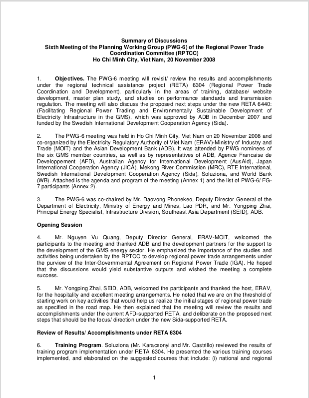
Sixth Meeting of the Planning Working Group (PWG-6) of the Regional Power Trade Coordination Committee (RPTCC-7)
The PWG-6 meeting will revisit/ review the results and accomplishments under the regional technical assistance project (RETA) 6304 (Regional Power Trade Coordination and Development), particularly in the areas of training, database/ website development, master plan study, and studies on performance standards and transmission regulation.
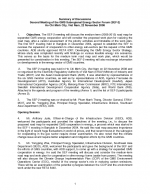
Second Meeting of the GMS Subregional Energy Sector Forum (SEF-2): Summary of Discussions
The SEF-2 meeting will discuss the medium term (2008-2015) road map for expanded GMS energy cooperation and will consider the proposed work plan for realizing the road map, after a careful assessment of the priority activities and timetable of the work plan. The first SEF meeting held in Bangkok in December 2004, agreed to establish the SEF to oversee the expansion of cooperation to other energy sub-sectors per the request of the GMS countries.
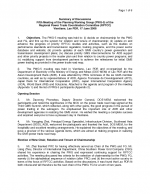
Fifth Meeting of the Planning Workshop Group (PWG-5) of the Regional Power Trade Coordination Committee (RPTCC): Summary of Discussions
The PWG-5 meeting was held to: (i) decide on chairmanship for the PWG and FG, and firm up the system for rotation and tenure of chairmanship; (ii) update on and advance the progress of priority RPTCC studies and activities, such as the studies on performance standards and transmission regulation, training programs, and the power sector database and website; (iii) provide updates of each GMS country's power generation and transmission development plans; (iv) discuss priority GMS interconnections for ADB support and other priority projects in the master plan and their relation to country powe
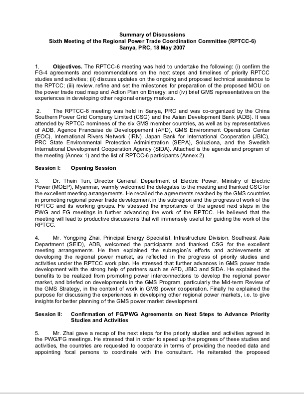
Sixth Meeting of the Regional Power Trade Coordination Committee (RPTCC-6)
The RPTCC-6 meeting was held to undertake the following: (i) confirm the FG-4 agreements and recommendations on the next steps and timelines of priority RPTCC studies and activities; (ii) discuss updates on the ongoing and proposed technical assistance to the RPTCC; (iii) review, refine and set the milestones for preparation of the proposed MOU on the power trade road map and Action Plan on Energy; and (iv) brief GMS representatives on the experiences in developing other regional energy markets.
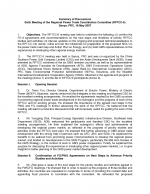
Sixth Meeting of the Regional Power Trade Coordination Committee (RPTCC-6): Summary of Discussions
The 6th Meeting of the Regional Power Trade Coordination Committee (RPTCC-6) was held to undertake the following:
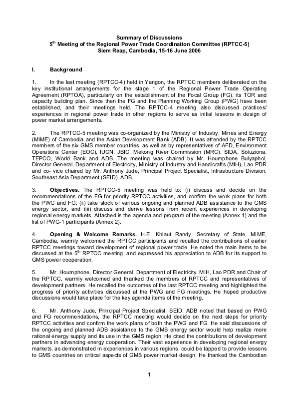
5th Meeting of the Regional Power Trade Coordination Committee (RPTCC-5) Siem Reap, Cambodia, 15-16 June 2006
In the last meeting (RPTCC-4) held in Yangon, the RPTCC members deliberated on the key institutional arrangements for the stage 1 of the Regional Power Trade Operating Agreement (RPTOA), particularly on the establishment of the Focal Group (FG), its TOR and capacity building plan. Since then the FG and the Planning Working Group (PWG) have been established, and their meetings held. The RPTCC-4 meeting also discussed practices/ experiences in regional power trade in other regions to serve as initial lessons in design of power market arrangements.
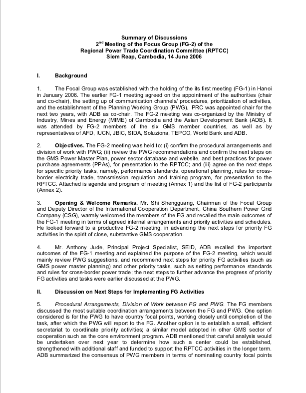
2nd Meeting of the Focus Group (FG-2) of the Regional Power Trade Coordination Committee (RPTCC-6)
The Focal Group was established with the holding of the its first meeting (FG-1) in Hanoi in January 2006. The earlier FG-1 meeting agreed on the appointment of the authorities (chair and co-chair), the setting up of communication channels/ procedures, prioritization of activities, and the establishment of the Planning Working Group (PWG). PRC was appointed chair for the next two years, with ADB as co-chair. The FG-2 meeting was co-organized by the Ministry of Industry, Mines and Energy (MIME) of Cambodia and the Asian Development Bank (ADB).
- ‹ previous
- 15 of 17
- next ›
